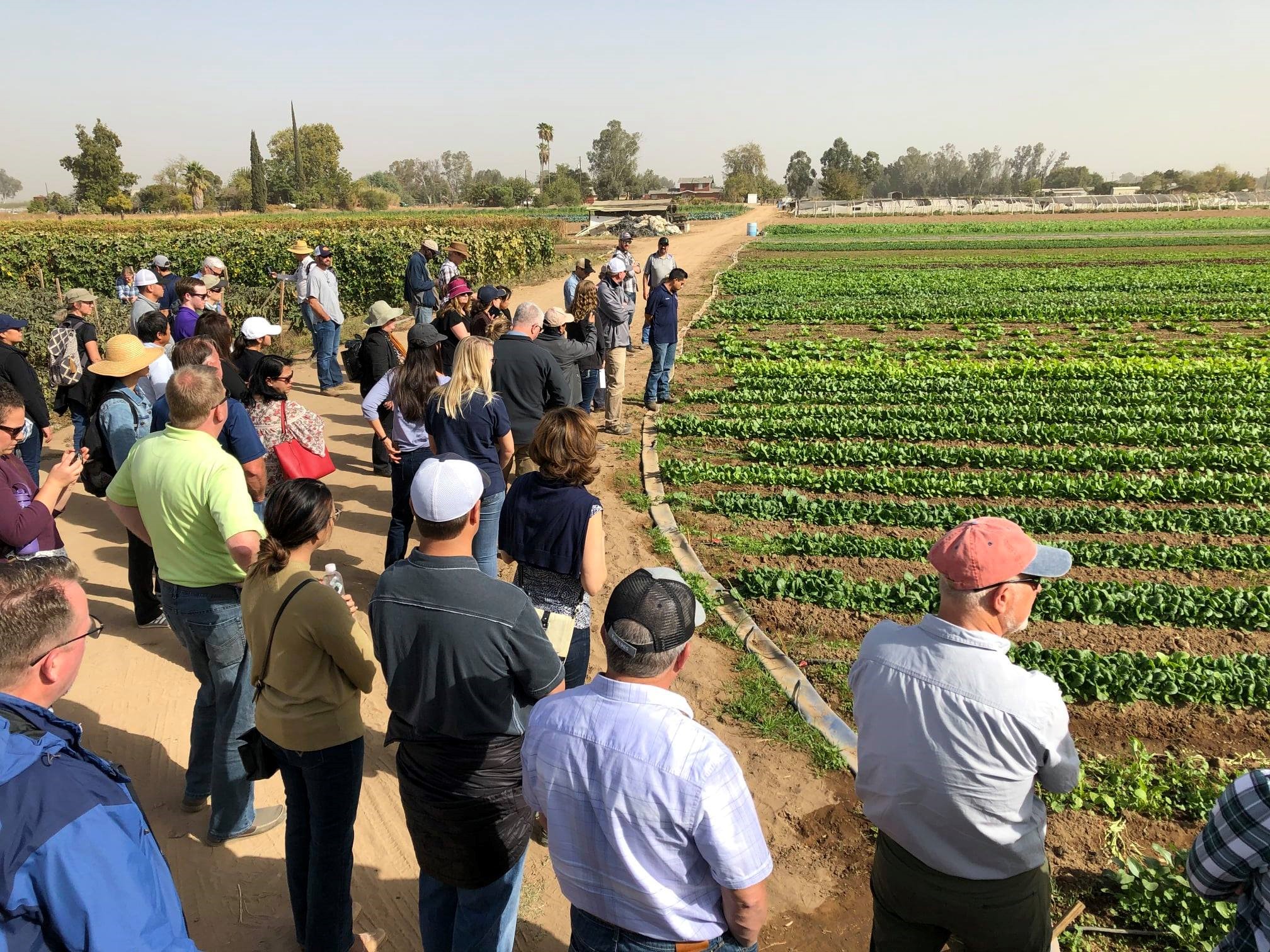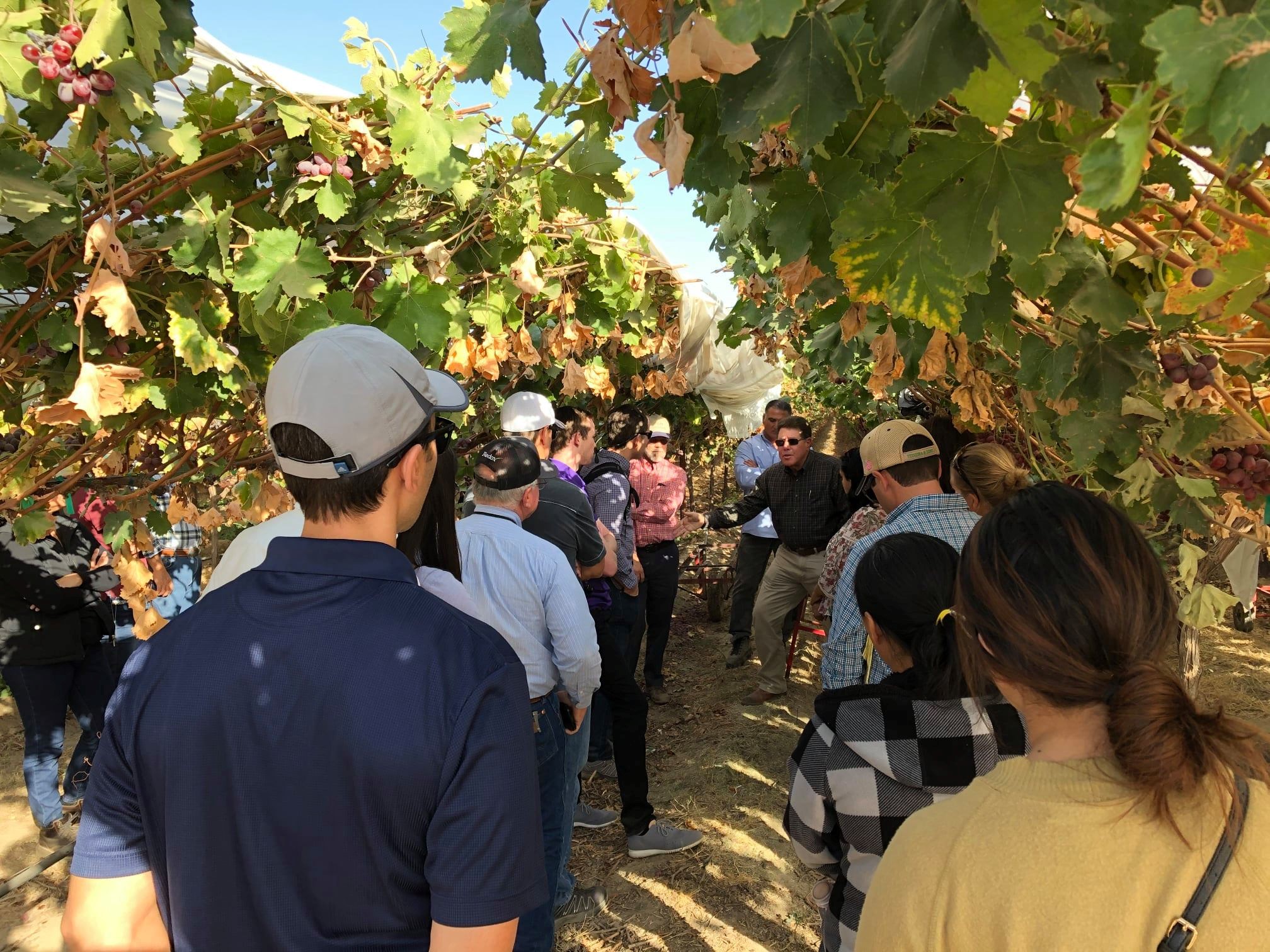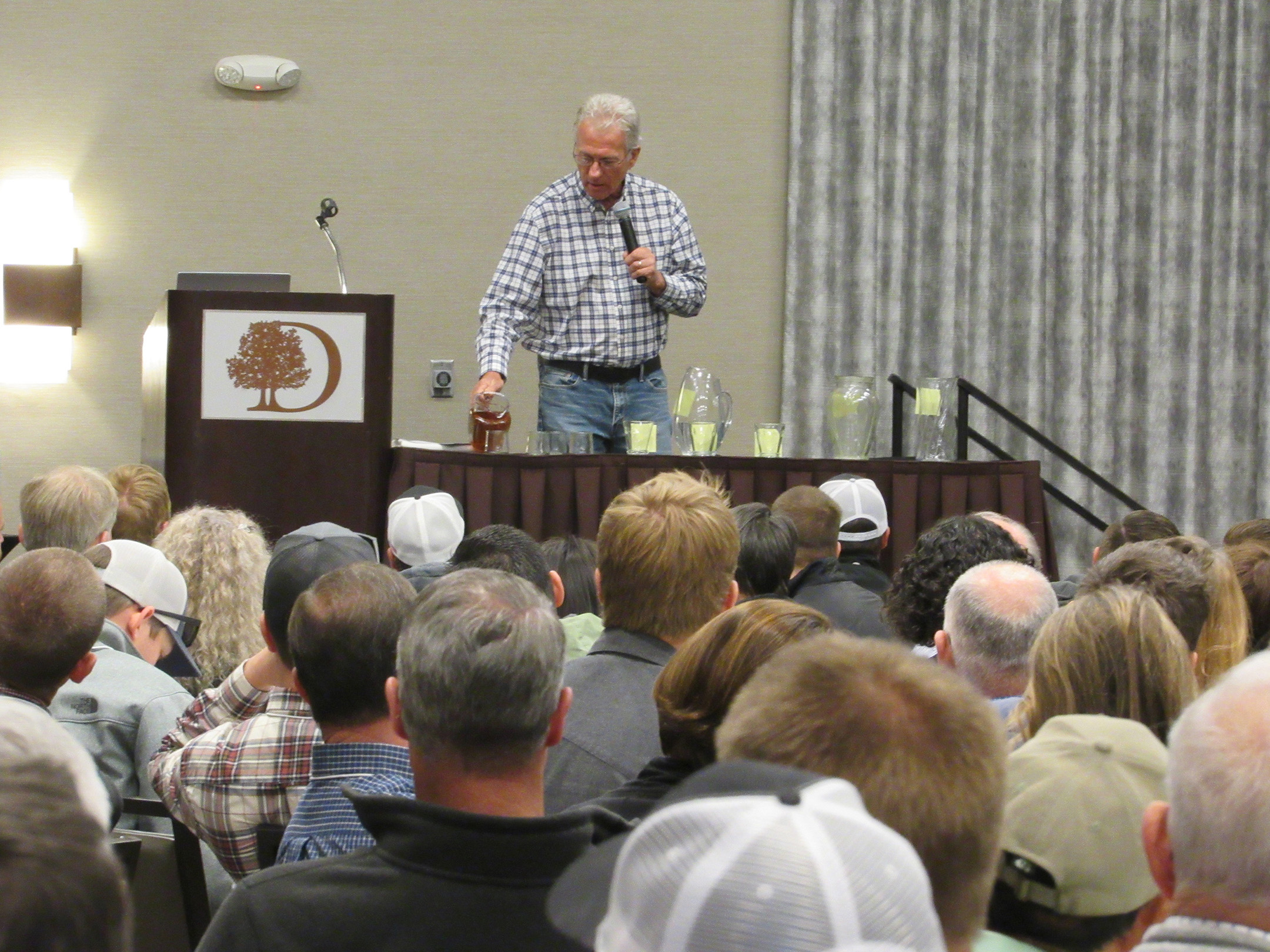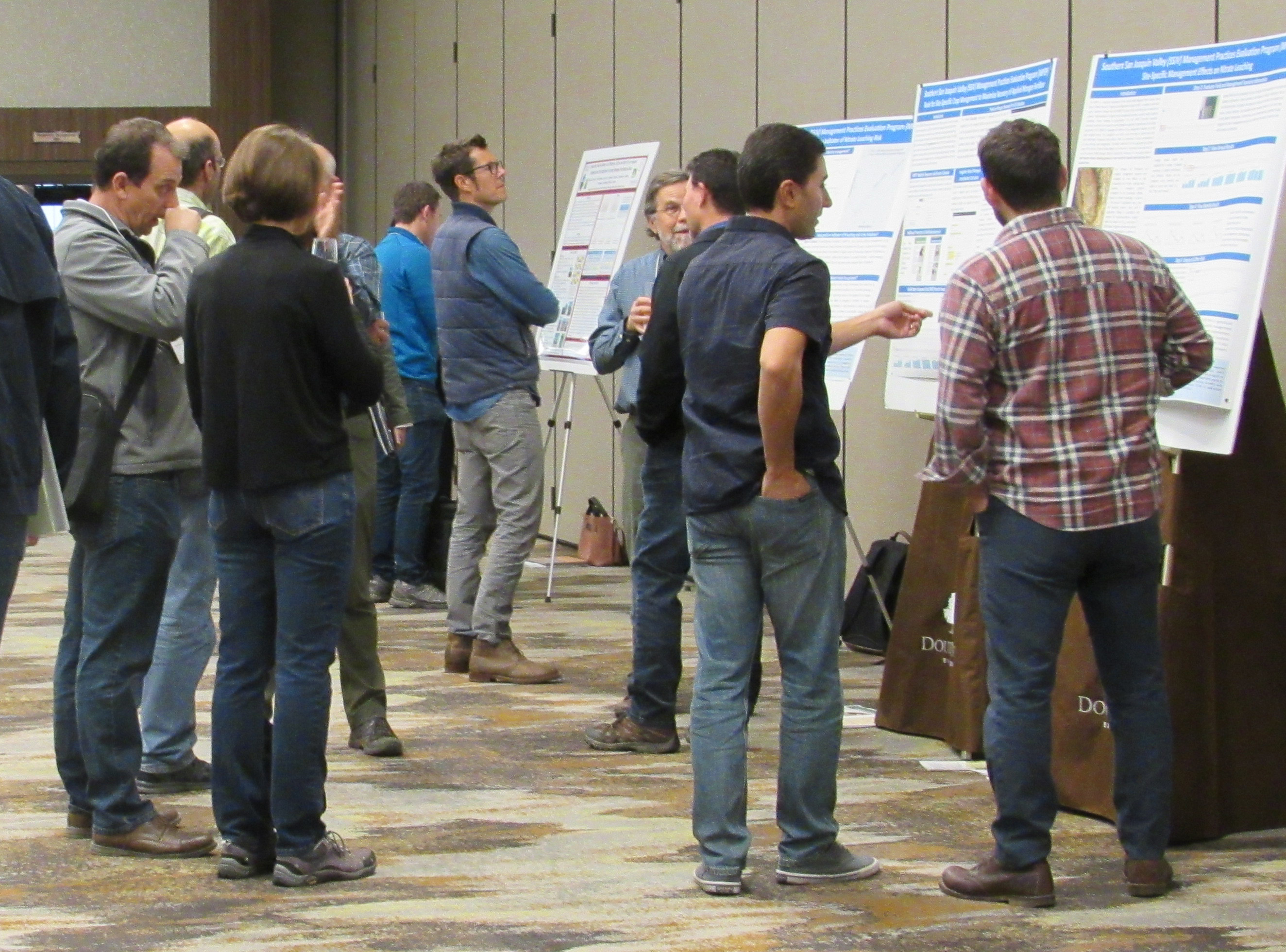The 27th annual Fertilizer Research and Education Program (FREP) and Western Plant Health Association (WPHA) Conference took place in Fresno, California, on October 28-30, 2019. Speakers from industry, academia and agricultural consulting provided pioneering information on nutrient and irrigation management in California agriculture. Below you will find highlights of some of the talks at this year’s conference.
The PowerPoint presentations for most speakers will be made available upon request. If interested in accessing a presentation, email the FREP team at FREP@cdfa.ca.gov with titles of the presentations that you are interested in viewing.
Day One: Farm Tour
More than 50 conference attendees joined FREP this year in visiting two unique agriculture operations in Fresno.


Day Two: Morning
The conference began with introductory comments from Renee Pinel, Executive Director of WPHA, and Karen Ross, Secretary of the California Department of Food and Agriculture (CDFA). They stressed the importance of furthering our efforts to improve on-farm nutrient management through research and education and they provided an excellent lead-in to the conference program. The morning session covered updates on three current FREP research projects aimed at developing decision-support tools and improving nitrogen management practices, as well as the organic farming techniques employed at Park Farming, located north of Sacramento.
Overview of CropManage: Inputs, Outputs and Users – Dr. Michael Cahn, Irrigation and Water Resources Advisor, University of California (UC) Cooperative Extension, Monterey County
Citrus: Nitrogen Management Practices and Recommendations – Dr. Douglas Amaral, Postdoc Scientist, Department of Plant Sciences, UC Davis
Effects of Soil Biochar Amendment on Soil Nitrogen Dynamics – Dr. Suduan Gao, Research Scientist, United States Department of Agriculture (USDA) Agricultural Research Service
A Normal California Farm, Farmed Abnormally – Scott Park, Owner/Operator, Park Farming
Speaker Highlight: Park Farming is a 1,700-acre organic farm just 50 miles north of Sacramento that relies on soil health to solve some of the major issues that California farmers are facing. Park stressed the importance of what he refers to as the “7 Cs” (cover crops, crop rotation, conservation tillage, crop residues, controlled traffic, compost and conserving inputs) in order to utilize the benefits that healthy soil can provide.
Day Two: Afternoon
The afternoon included a variety of engaging presentations, including a demonstration during lunch, a panel discussion and the choice of annual or perennial workshops. The day ended with a poster session, covering nutrient management research throughout the state.
Nitrogen Management Plans: Where Is This All Leading? – Parry Klassen, Executive Director, East San Joaquin Water Quality Coalition
Panel: Nitrogen Budgeting with Organic Amendments – Facilitator: Dr. Karen Lowell, Agronomist, USDA Natural Resources Conservation Service Panelists: Gina Colfer, Crop Consultant, Wilbur Ellis; Ward Burroughs, Owner, Burroughs Family Farms; Dr. Joji Muramoto, Organic Production Specialist, UC Cooperative Extension; and Gerald Davis, Lead Agronomist, Grimmway Farms
Nitrogen and Irrigation Management Planning Workshop
Annuals
- Do-It-Yourself Tensiometer – Dr. Michael Cahn
- Soil Nitrate Quick Test – Dr. Mark Lundy
- Nitrogen Budget Exercise – Dr. Daniel Geisseler
Perennials
- Irrigation Scheduling Pressure Chamber – Dr. Ken Schakel
- Soil Amendments – Dr. Sat Darshan S. Khalsa
- Nutrient Management Considerations – Dr. Sebastian Saa
- CropManage Demonstration – Dr. Michael Cahn
Poster Session
Irrigation and Nitrogen Management and Monitoring to Improve Almond Production While Minimizing Groundwater Nitrate – Hanna Ouaknin
Quantifying Nitrate Leaching in an Organic System Using Anion Exchange Resin Pucks – Aaron Lee
A Multi-scale Modeling Assessment of Nitrogen Leaching from Central Valley Irrigated Processing Tomatoes – Iael Raij-Hoffman
The Effect of Pre-Plant Fertilizer Management on Yield, Nitrogen Uptake and Disease Incidence in Four Strawberry Cultivars – Kamille Garcia-Brucher
Nitrogen Balance as an Indicator of Nitrate Leaching Risk – Tim Hartz
Site-Specific Management Effects on Nitrate Leaching – Kenneth Miller
Tools for Site-Specific Crop Management to Maximize Recovery of Applied Nitrogen Fertilizer – John Dickey Comparing Yield and Water Use Efficiency of Drip and Deficit Drip Irrigated Sorghum and Corn Subjected to Varying Nitrogen Fertilization Rates – Ramandeep Kaur Brar


Day Three
On the last day of the conference, speakers highlighted practical in-field applications of nutrient and irrigation management research and education. The session included talks on potassium, soil texture, salinity, deficit irrigation in high density olives, and irrigation system design and maintenance.
Potassium Fertilization in Crops – Dr. Saiful Muhammad, Research Agronomist, QualiTech
Irrigation Maintenance and Distribution Uniformity – Trina Walley, District Manager, East Stanislaus Resource Conservation District
Characterizing Soil Texture for Water and Nutrient Management – Dr. Toby O’Geen, Soil Resource Specialist in Cooperative Extension, Department of Land, Air and Water Resources, UC Davis
Deficit Irrigation and Nutrient Management in High Density Olive Orchards – Dr. Richard Rosecrance, Professor, California State University Chico
Best Practices for Fertigation Design and Equipment – Dr. Franklin Gaudi, Project Manager, Cal Poly Irrigation Training and Research Center
Speaker highlight: Franklin Gaudi, a project manager at Cal Poly’s Irrigation Training and Research Center (ITRC), engaged attendees with an overview of irrigation and fertigation system design and the common problems and solutions. He also introduced the “Irrigation Consumer Bill of Rights” which provides growers with a list of discussion items to make more informed decisions when selecting design and maintenance options. http://www.itrc.org/reports/icbr.htm
Salinity Effects and Management – Mark Battany, Water Management and Biometeorology Advisor, UC Cooperative Extension, San Luis Obispo and Santa Barbara Counties
Looking Forward
The FREP team would sincerely like to thank our speakers, volunteers and attendees for making the event such a success. Next year’s conference will be held in Modesto, California, on October 26-28. If you have suggestions for speakers that you would like to hear from or farms that we might visit on next year’s tour, please reach out to us at FREP@cdfa.ca.gov.


